Topics
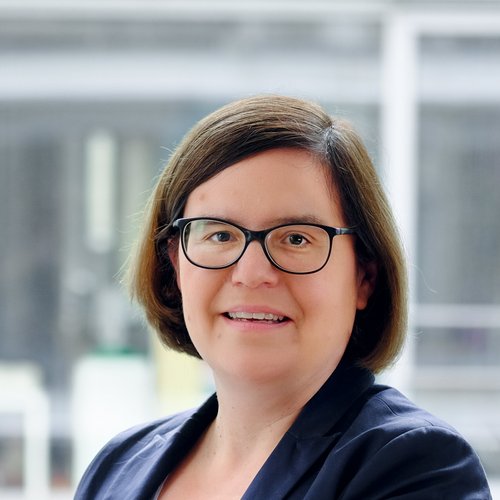
Dr. Adriana Neligan
Senior Economist for Environment, Circular Economy and Sustainability
Tel: +49 30 27877-128 Mail: neligan@iwkoeln.de Adriana Neligan @a_neligan- Joined the German Economic Institute in 2004
- Studied Economics at the Universities of Augsburg, Valladolid and Dublin
Research unit
IW Publications
Kolev-Schaefer, Galina / Neligan, Adriana, 2024, Due Diligence - Effect of Supply Chain regulation. Data-based results on the effects of the German Supply Chain Act, IW-Report, Nr. 8, Köln / Berlin
Zur Studie
Neligan, Adriana / Schleicher, Carmen / Engels, Barbara / Kroke, Thorsten, 2023, Digitaler Produktpass — Enabler der Circular Economy. Relevanz und Umsetzbarkeit durch Unternehmen, IW-Report, Nr. 47, Berlin / Köln
Zur Studie
Bähr, Cornelius / Bardt, Hubertus / Neligan, Adriana, 2023, Optionen der deutschen Wirtschaft für eine sichere Rohstoffversorgung, in: IW-Trends, 50. Jg., Nr. 3, S. 67-86
Zur Studie
Fluchs, Sarah / Neligan, Adriana, 2023, Urban Mining für eine zirkuläre Wirtschaft. Wie hoch sind die Rohstoffpotenziale durch Urban Mining?, IW-Report, Nr. 2, Köln / Berlin
Zur Studie
Fluchs, Sarah / Neligan, Adriana / Wendland, Finn Arnd, 2022, Klimaschutzinvestitionen, in: IW-Trends, 49. Jg., Nr. 2, S. 55-72
Zur Studie
Fluchs, Sarah / Neligan, Adriana / Schleicher, Carmen / Schmitz, Edgar, 2022, Zirkuläre Geschäftsmodelle. Wie zirkulär sind Unternehmen?, IW-Report, Nr. 27, Köln / Berlin
Zur Studie
Kolev, Galina / Neligan, Adriana, 2022, Effects of a supply chain regulation. Survey-based results on the expected effects of the German Supply Chains Act, IW-Report, Nr. 8, Köln / Berlin
Zur Studie
(in cooperation with Hubertus Bardt)
Der Rohstoffverbrauch in Europa nimmt ab
IW-Kurzbericht 25/2019
(in cooperation with Markus Demary)
Defining Green Bonds – The Danger of Neglecting the Issuer Side
IW policy papers 2/2019
(in cooperation with Frank Obermüller)
Geschäftsmodell Klimaschutz
IW-Kurzbericht 77/2018
(in cooperation with Markus Demary)
Are Green Bonds a Viable Way to Finance Environmental Goals? – An Analysis of Chances and Risks of Green Bonds
IW-Report 28/18
Two years later: The EU Circular Economy Package
IW policy papers 9/2018
2025 recycling target: only 10 EU countries on track
IW-Kurzbericht 28/2018
(in cooperation with Theresa Eyerund)
Verschwenderische Generationen X und Y
IW-Kurzbericht 56/2017
(in cooperation with Edgar Schmitz)
Eines von zwei Unternehmen macht Ökodesign digital
IW-Kurzbericht 29/2017
(in cooperation with Theresa Eyerund)
In der kreativen Nische kommt Bio-Essen auf den Tisch
IW-Kurzbericht 16/2017
(in cooperation with Edgar Schmitz)
Digitale Strategien für mehr Materialeffizienz in der Industrie
IW-Report 3/2017
Moving towards a Circular Economy – Europe between Ambitions and Reality
IW policy papers 9/2016
(in cooperation with Oliver Koppel)
Wertstoffsammlung und -verwertung: Drohende Rekommunalisierung – innovationsfeindlich und ineffizient
IW-Kurzbericht 28/2016
(in cooperation with Karl Lichtblau)
Das IW-Zukunftspanel – Ziele, Methoden, Themen und Ergebnisse
Institut der deutschen Wirtschaft (Hrsg): IW-Studien, Köln, 2009
(in cooperation with Karl Lichtblau)
Die mikroökonomische Perspektive – die Bedeutung von Systemköpfen und Netzwerken
Michael Hüther, Randolf Rodenstock, Burkhard Schwenker, Jürgen R. Thumann (Hrsg): Systemkopf Deutschland Plus – Die Zukunft der Wertschöpfung am Standort Deutschland, IW-Studien, Köln, 2008, S. 65–69
(in cooperation with Christoph Schröder)
Arbeitskosten im Verarbeitenden Gewerbe unter Berücksichtigung des Vorleistungsverbunds
IW-Trends 1/2006
(in cooperation with Karl Lichtblau, Iris Richter)
Erfolgsfaktoren von M+E-Clustern in Deutschland
IW-Trends 2/2005
Expertises
(in cooperation with Esther Chrischilles, Thomas Puls, Thilo Schaefer)
Konsistente europäische Industrie-, Klima-und Energiepolitik
Gutachten im Auftrag des BDI, 2016
(in cooperation with Sebastian van Baal, Edgar Kreilkamp, Thorsten Lang, Leonard Jürgens)
Entwicklungsfaktor Tourismus: Der Beitrag des Tourismus zur regionalen Entwicklung und lokalen Wertschöpfung in Entwicklungs- und Schwellenländern
Studie im Auftrag des BTW, 2015
(in cooperation with Roman Bertenrath, Cornelius Bähr, Thilo Schaefer)
Versorgungssicherheit mit Energierohstoffen
Gutachten im Auftrag von RWE Power AG, 2015
(in cooperation with Roman Bertenrath, Raphaela Smarzcz)
Ermittlung und Priorisierung der wichtigsten Maßnahmen zum Bürokratieabbau aus Sicht kleiner Unternehmen im Freistaat Sachsen
Bericht für das Sächsische Staatsministerium für Wirtschaft, Arbeit und Verkehr, Köln, 2013
(in cooperation with Sebastian van Baal, Karl Lichtblau)
Industrielle Wertschöpfung – ein Baukastensystem
Studie erstellt für den Bundesverband der Deutschen Industrie, Köln, 2013
(in cooperation with Michael Hüther et al.)
Umfang des bürgerschaftlichen Engagements von Unternehmen
Erster Engagementbericht – Für eine Kultur der Mitverantwortung, Berlin, 2012, S. 522–571
„Deutschland-Check“ – eine Politikbewertung in der WirtschaftsWoche
Verschiedene Ergebnisberichte für die Initiative Neue Soziale Marktwirtschaft, Berlin, 2009-2011
(in cooperation with Karl Lichtblau)
Momentane Situation und zukünftige Einschätzung der deutschen Unternehmen im Hinblick auf die Ausbildungssituation und die Auswirkungen der Krise auf den Fachkräftebedarf
Studie für das Bundesministerium für Wirtschaft und Technologie, Köln, 2009
(in cooperation with Karl Lichtblau)
Analyse der volkswirtschaftlichen Bedeutung der Wertschöpfungskette Bau
Bericht für das Bundesamt für Bauwesen und Raumordnung, Köln, 2008
(in cooperation with den Universitäten stuttgart und Karlsruhe, WestLB AG und rfu)
Immoinvest – Grundlagen nachhaltiger Immobilieninvestments
Bericht für das Bundesamt für Bauwesen und Raumordnung, Stuttgart, 2008
(in cooperation with Edgar Schmitz)
Lage und Entwicklung des Maschinen- und Anlagenbaus in den neuen Bundesländern, Ergebnisse aus dem IW-Zukunftspanel
Bericht für den Verband Deutscher Maschinen- und Anlagenbau Nordost, Köln/Berlin, 2008
(in cooperation with Karl Lichtblau)
Wie sieht die Zukunft der Industrie in Dortmund aus?
Studie erstellt für die Wirtschaftsförderung Dortmund, Köln, 2007
Beschäftigungsperspektive M+E. Direkte und indirekte Beschäftigungspotenziale der M+E-Industrie in Deutschland
Studie für Gesamtmetall, Köln, 2006
(in cooperation with Karl Lichtblau)
Märkisches Südwestfalen – Zukunft mit Industrie
Studie und Broschüre für Südwestfälische Industrie- und Handelskammer zu Hagen, Köln, 2006
Export schafft Wertschöpfung – Deutschland ist keine Basarökonomie
Studie für Initiative Neue Soziale Marktwirtschaft, Köln, 2005
(in cooperation with Karl Lichtblau)
M+E-Cluster in Hessen
Studie für Hessenmetall, Köln, 2005
(in cooperation with Karl Lichtblau)
Die Zukunft der Metall- und Elektroindustrie – Stärken und Schwächen
Studie für Gesamtmetall, Köln, 2005
External Publications
Lichtenthäler, Sarah / Neligan, Adriana, 2023, How Circular Are Businesses in Germany? in: Intereconomics: Rethinking Resoucrce Efficiencey: Europe's Transition to a Circular Economy, Volume 58, Nr. 2, S.79-86
Zur Studie
Neligan, Adriana / Baumgartner, Rupert J. / Geissdoerfer, Martin / Schögg, Josef-Peter, 2022, Circular disruption. Digitalisation as a driver of circular economy business models, in: Business Strategy and the Environment, S. 1–14
Zur Studie
Digitalisation as Enabler Towards a Sustainable Circular Economy in Germany
Intereconomics, 53. Jg., Heft 2, 2018, S. 101–106
EU Circular Economy Package: A Challenging Yet Important Impulse
Director Notes, Conference Board, 9. Jg., Heft 3
https://www.iwkoeln.de/fileadmin/user_upload/Studien/Gutachten/PDF/2018/Gastbeitrag_Neligan_2018_Circular_Economy.pdf
(in cooperation with Fernando Blumenschein et al.)
Fostering the Sustainability of Global Value Chains (GVCs)
T20 Policy Brief, 2017
(in cooperation with Matthias Diermeier, Henry Goecke)
Rohstoffbezug deutscher Unternehmen in globalen Wertschöpfungsketten
Wirtschaftsdienst, 97. Jg., Heft 7, S. 499–505
Pläne der EU-Kommission - Auch wir müssen mehr recyceln
Alternative Kommunalpolitik, Heft 6, 2016, S. 33
(in cooperation with Hubertus Bardt)
Versorgungssicherheit mit Energierohstoffen
VGP Powertech, Heft 11, 2015, S. 25–29
(in cooperation with Hubertus Bardt)
Security of Supply of Energy Commodities / Versorgungssicherheit mit Energierohstoffen
World of Mining - Surfaces & Unterground, Heft 4, 2015, S. 239–245
(in cooperation with Christian Gromer, Henry Schäfer)
The Demand for Sustainable Property Investments in Germany – An Explorative Empirical Study
Journal of Property Investment & Finance, 30. Jg., Heft 1, 2012, S. 5–17
Public Funding and Repertoire Conventionality in the German Public Theatre Sector – An Econometric Analysis
Applied Economics, 38. Jg., Heft 10, 2006, S. 1111–1121
(in cooperation with John O’Hagan)
State Subsidies and Repertoire Diversity in the Non-Profit English Theatre Sector – An Econometric Analysis
Journal of Cultural Economics, 29. Jg., Heft 1, 2005, S. 35–57
(in cooperation with John O’Hagan)
Innovation and Diversity in Repertoire – Some Key Policy Issues for the Grant-aided and Commercial Theatre Sectors
Sara Selwood (Hrsg.): The Cultural Sector in the UK – Outline and Policy Issues, Policy Studies Institute, London, 2001, S. 217–234
More from Dr. Adriana Neligan
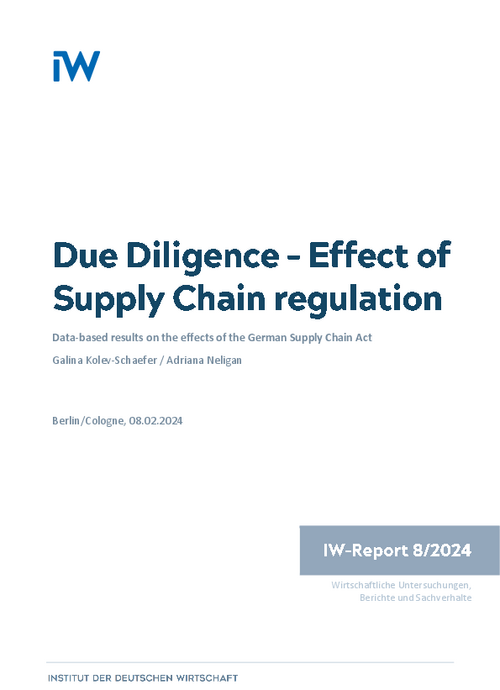
Due Diligence - Effect of Supply Chain regulation: Data-based results on the effects of the German Supply Chain Act
After the agreement of the European Parliament and the Council of the EU in December 2023, a few formal steps remain to introduce the Corporate Sustainability Due Diligence Directive (CSDDD).
IW
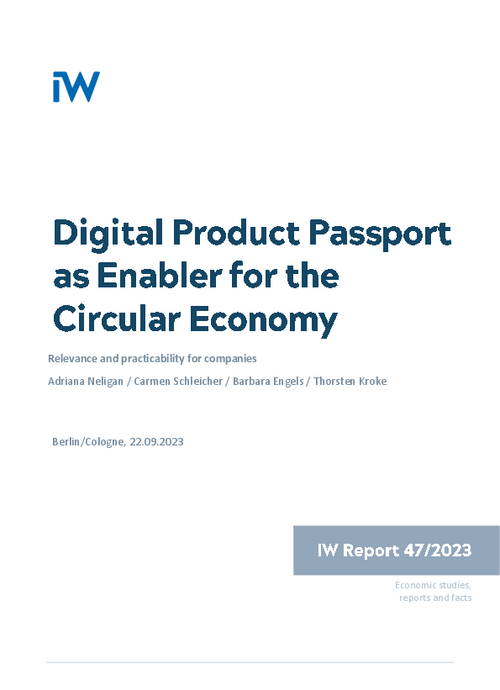
Digital Product Passport – Enabler of the Circular Economy
In a circular economy, a new understanding of economic activity and an alternative approach to raw materials are required. Resources should be used for as long as possible in order to reduce both the material and energy consumption as well as the waste and emissions of an economic system to a minimum.
IW
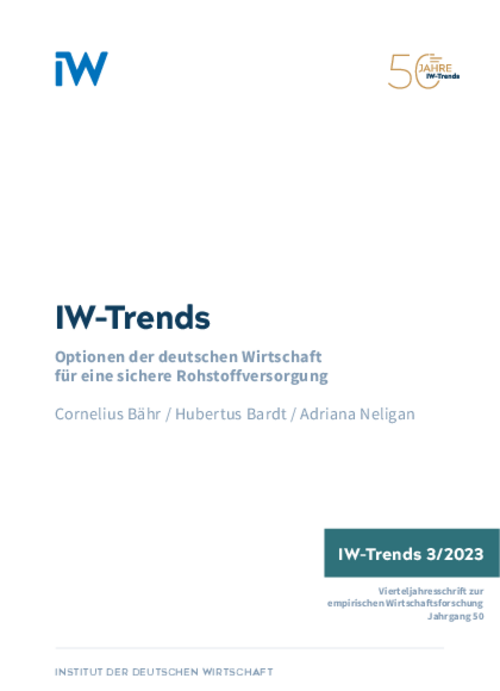
German Industry's Options for a Secure Supply of Raw Materials
In recent years German industry has seen a rise in the risks attached to its procurement of raw materials.
IW
How Circular Are Businesses in Germany?
A low-carbon economy could be more readily achieved by improving resource efficiency and thinking in cycles. Consequently, we need a new understanding of economic activity and an alternative approach to raw materials.
IW
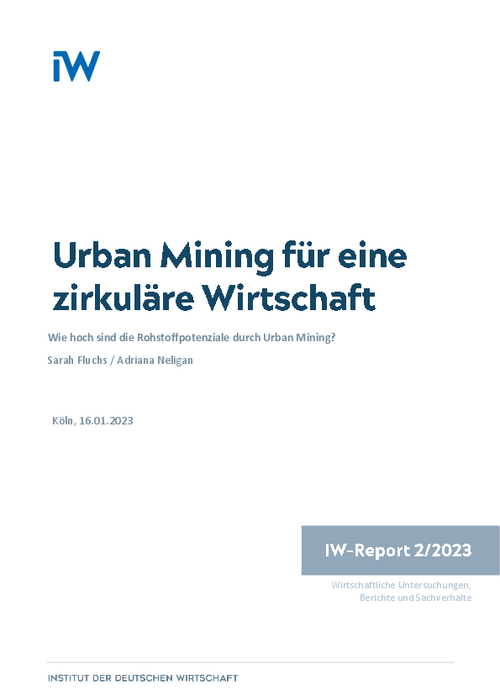
Urban mining for a circular economy: How high are the raw material potentials through urban mining?
Natural resources are becoming increasingly scarce, one reason being that significantly more natural raw materials are currently being mined and processed worldwide than Earth can provide over the same period.
IW
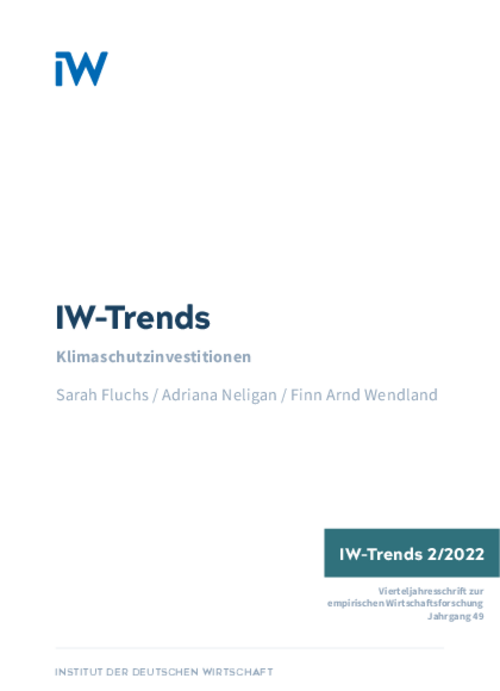
Climate Investments: Definitions and Documentation Principles
Achieving climate neutrality requires investment in technologies which protect the climate from global warming and necessitates a process of transformation in all sectors of the economy.
IW
Circular disruption: Digitalisation as a driver of circular economy business models
New circular business models can evolve at all stages of the life cycle of a product. Digitalisation can drive disruptive innovations, new business models and novel ways of collaboration and thus can accelerate the economic transition to more resource-efficient and circular production systems.
IW
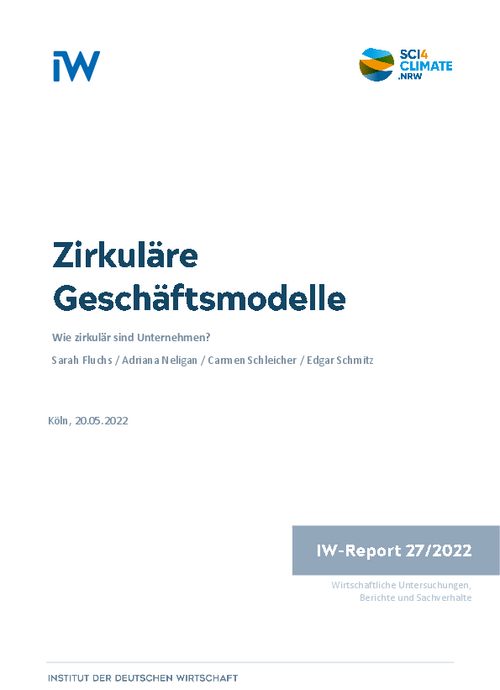
Circular Business Models: How circular are companies?
On the way to climate neutrality, the transition from a linear economy to a circular economy plays an important role. Resource cycles can be implemented in different ways in companies.
IW
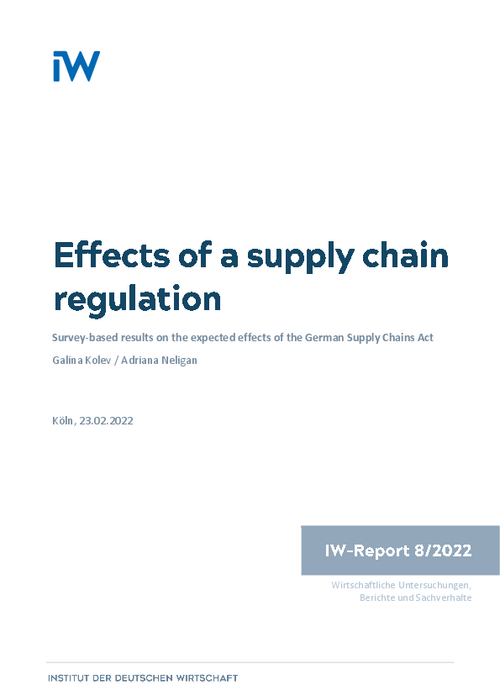
Effects of a supply chain regulation
The European Commission is planning a new regulation for mandatory human rights and environmental due diligence (Due Diligence Directive) as part of the Sustainable Corporate Governance initiative. The long-awaited EU proposal is expected to have requirements that go far beyond the German Act on Due Diligence in Supply Chains (the so-called Lieferkettensorgfaltspflichtengesetz), which was regarded as a possible blueprint for a European solution. The present paper contributes to the debate on an EU due diligence regulation by presenting results of a recent survey conducted by the German Economic Institute (IW) on the potential impact of the already adopted German Act on Due Diligence in Supply Chains.
IW
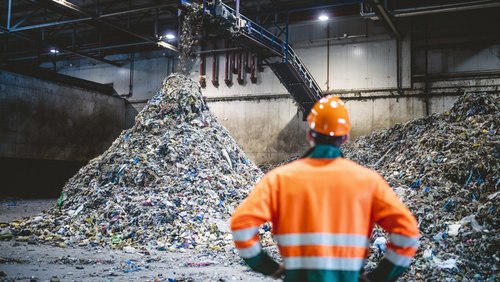
Circular economy: How waste shipments contribute to protecting the environment
The European Commission aims at further reducing illegal waste exports and is therefore revising its regulations. Legal waste shipment is an important step towards an efficient circular economy: it reduces resource utilization and saves CO2.
IW